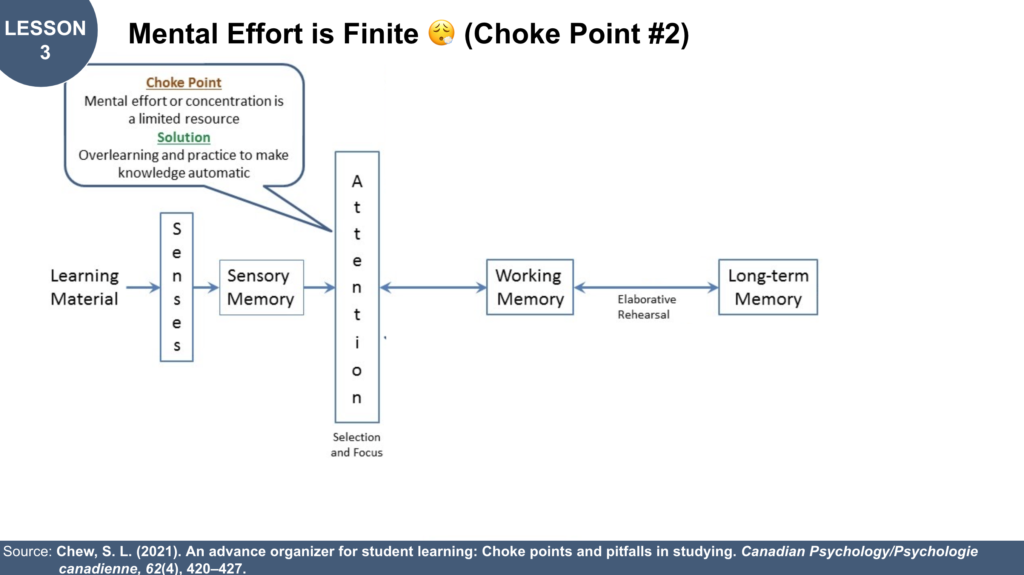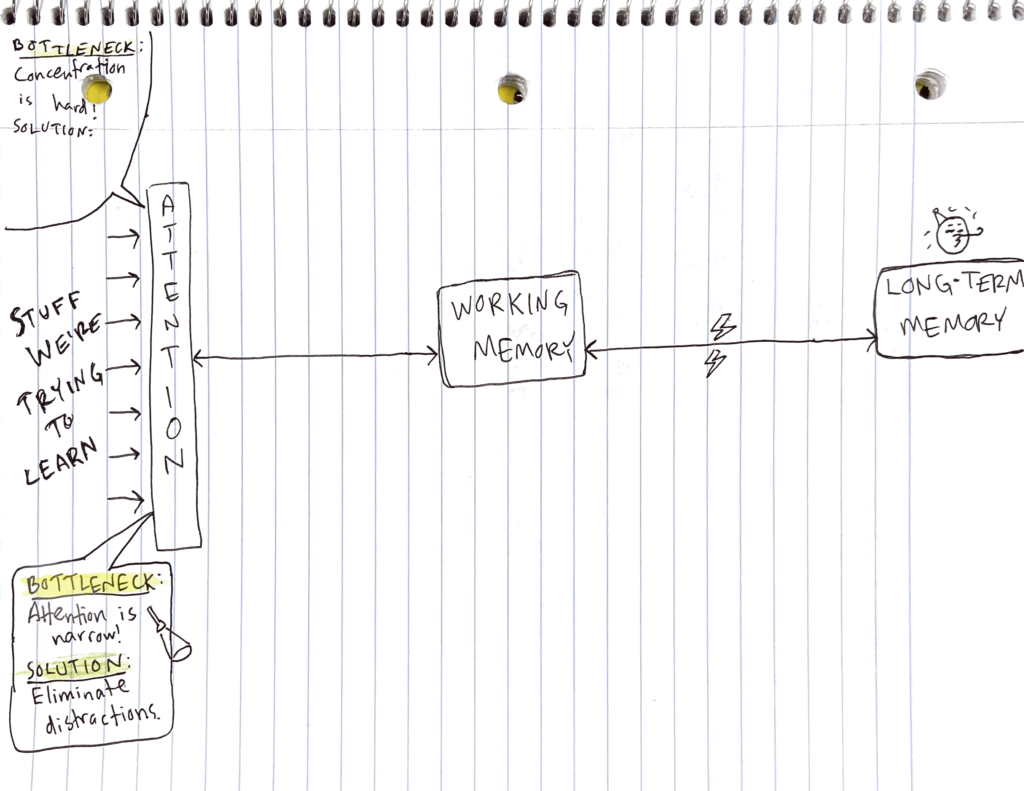Hey there, colleague! What follows is a mini-lesson that teaches secondary students how to learn more effectively. It's part of a series, which you can access right here. When we teach students about learning, we empower them to work smarter and get better results for their effort. This is massively important for cultivating the five key beliefs beneath student motivation.
Without further ado — here's today's post! -DSJR

All right, students — who's ready to do some learning about learning? Let's get out the page in our notebooks where we were learning about how learning works — aaaaaaand as you get those out, see if you can share with your partner, from memory, what the four bottlenecks of learning are. Go! Try to come up with all four — super bonus swag points for any pair that gets all four without looking.
[Note to reader: super bonus swag points are not a thing.]
All right — let's review those bottlenecks:
- Attention is narrow
- Concentration is hard
- Working memory is limited
- We forget stuff
Now, do these bottlenecks apply to just some learners, or to all learners?
Yes — alllllll learners. Every human being you've ever met is limited by these bottlenecks.
So, to learn as effectively as we can, we've got to DEAL with these limitations. These are our constraints!
Now let's start adding today's bottleneck — concentration is hard!

By the way, how do you like that COLORING I added to yesterday's bottleneck? Check out that colored pencil work. That is EXCELLENT. Thank you.
Now — let's talk about concentration. Who in this room feels like they are at least 1% less intelligent during sixth hour than they are during, say, third hour?
Nice! Look around. Most of us. And, good job, hand raisers — you are almost certainly right! That's not because your long-term memory has become damaged throughout the day — it's because your ability to concentrate has become fatigued. It's tired! You're tired.
As the day goes on, if we've been working hard to concentrate all day long, our attention becomes fatigued. That's true for all human beings — none of us can concentrate endlessly. We all get tired out. That's why this is Bottleneck #2.
So, how do we solve this?
Well, it's not doing a bunch of concentration exercises — it's not making our concentration muscles bigger. No.
Instead, what Dr. Chew recommends based on cognitive science is overlearning and practicing our knowledge to the point where it becomes automatic. Let's write it down, and as we're writing it, I'll illustrate with a common example.

All right, so driving — how many of you have a parent or guardian in your life who drives a car but isn't always 100% focused on driving while they are driving? I'm talking about someone that's able to, say, talk to you while they drive, or adjust the rearview mirror, or take a phone call. We've all seen this kind of thing, right?
So, what in the world is going on? Why doesn't this lead to crashing — because attention is narrow, Bottleneck 1 — or instant brain fatigue — because of Bottleneck 2?
Because after years of driving, you overlearn the knowledge and skill that goes into it — and this makes the process pretty fantastically automatic. To the point where, when Mr. Painter arrives to school each morning after his 15-minute commute down a busy highway, he's not exhausted — instead, he's had three new ideas for his lesson plans on the way, and he's excited to get to work!
This kind of automaticity is something our brains LOVE. There's a cognitive scientist in Virginia named Dan Willingham who puts it this way: Whenever we can, we will AVOID thinking. Why!? Because the concentration required by thinking is hard!
So here's what our brains are marvelous at doing — overlearning things.
The trick then, in all of your classes, is to overlearn course material: names, vocabulary, the order of operations in mathematics, the keyboard shortcuts in your Modern Business class, and so on. When you overlearn material, you don't have to concentrate as hard to think about it — and this makes learning a lot less of a drag.
Now, last thing: how do we overlearn material?
We'll get to this more in later lessons, but for now, think about some of the strategies I've shared with you a million times now.
- Quizzing yourself
- Giving pretend lectures on our essential questions
- Trying to use new vocabulary words outside of class
- Seeing if you can stump your classmates with what we learned in class today
These are really basic but effective ways to practice what you've learned. Over the long run, they make learning a heckuva lot easier — and more fun.
More tomorrow! But now — on to our regularly scheduled programming.
Note from Dave: This article is part of a series of mini-lessons designed to improve student motivation by cultivating the Effort and Efficacy beliefs. More on the series here; more on the idea of the five key beliefs here.

SSColoring.com says
Hi Dave, I completely agree—concentration is hard, especially for young learners. That’s why creative activities like coloring can be a great way to build focus in kids! At SSColoring.com, I always say: “Start small, one page at a time!” These little moments of calm with crayons help kids stay engaged and feel successful.
Dinosaurus kleurplaat says
This was such a refreshing read! Concentration really is hard, and I appreciate how honestly you broke that down. The idea that automaticity frees up cognitive space for deeper thinking really stuck with me. Thanks for the reminder to keep practicing the basics!
Huggy Wuggy says
Thank you for such a lively and relatable explanation of why concentration is hard! I especially loved the driving analogy — it really clicks. Once a skill becomes automatic, our brain doesn’t have to strain to focus on it, which frees up energy for deeper thinking. It’s so helpful for students (and adults!) to hear that attention fatigue is normal — and even better to know that there are clear strategies to manage it. Overlearning as a way to lighten the cognitive load makes so much sense. Looking forward to the next mini-lesson!